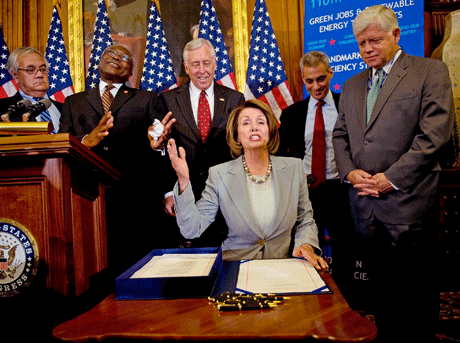 Kearneysville, WV. According to a story from the Associated Press, freshman Congressman Jason Chaffetz (R-Utah) thinks the U.S. House of Representatives spends too much time passing frivolous resolutions.
Kearneysville, WV. According to a story from the Associated Press, freshman Congressman Jason Chaffetz (R-Utah) thinks the U.S. House of Representatives spends too much time passing frivolous resolutions.
Things came to a head when a proposal was made to memorialize the start of the 142nd season at the Saratoga race course in New York. Speaking on the house floor, Rep. Chaffetz declared the proposal “an embarrassment.” But this sort of thing is not unusual. Only this year the House has honored such figures as Phil Mickelson, the Chicago Blackhawks, Jimmie Johnson, and the Penn State woman’s volleyball team. After Chaffetz delivered his incensed speech, the resolution passed 396-14. Clearly, his words pricked a few consciences, for such measures generally pass unanimously.
According to the article,
Every week the House spends a couple of days churning out such non-controversial bills. Beyond honoring sports achievements, they name post offices, praise armed service members, mourn distinguished people who’ve died and recognize historic anniversaries. This year the House has come together to support national pollinator week, national dairy month and national train day.
Apparently Chaffetz only recently saw the light, for he willing went along with earlier resolutions. He has decided that when the object of the bill is an athlete (or a racetrack), he can’t in good conscience go along with the crowd.
Chaffetz, in an interview, said he’s got nothing against recognizing worthwhile causes such as breast cancer awareness, “but there are too many of them and they’re just too frivolous.” He said he drew the line at sports bills because athletes already get “more than their fair share of accolades.”
It is nice to know that a congressman has limits. While he is perfectly happy recognizing worthy causes like breast cancer awareness and national pollinator week, resolutions recognizing athletes are “too frivolous.” He can tolerate frivolity but only in moderation. But what, exactly, makes a resolution recognizing national pollinator month worthy (not too frivolous) and one honoring an athlete too frivolous? Of course, the congressman can’t make a constitutional argument, for there is none to be made. In light of the U.S. Constitution, all such resolutions are not only frivolous but they exceed the proper role of the Congress.
Since the constitutional argument is ignored (apparently, like the Constitution itself) Chaffetz finds himself on shaky ground. His reason for voting against resolutions honoring athletes? They already get “more than their fair share.” Well. The principled Constitutional argument sits by the wayside while the good Congressman trots out this bit about fairness. Athletes get plenty of accolades, so Congress doesn’t need to give them any more. By this logic, part of the business of Congress is to sprinkle accolades around like pixie dust making sure that no one gets more than his or her fair share. James Madison, where are you?
Apparently, the pressure to vote for these resolutions is truly oppressive. D.C. Delegate, Eleanor Holmes Norton, the manager of the race track bill, issued a stern rebuke that in its stilted formality almost sounds like a threat: “It ill behooves the other side to trivialize a bill by a member.” Under such a tongue-lashing, Chaffetz finally settled on a clear principle, never mind the fact that it has nothing to do with the Constitution and it blatantly contradicts his concerns about fairness:
He said his personal rule was to vote only for sports resolutions honoring teams that had actually won a championship.
But haven’t these champions already received plenty of accolades?
One Congressman, Jason Altmire (D-PA) voted against the race track resolution; nevertheless, he thinks there are good reasons that such bills are part of the Congressional docket. They “get lawmakers to the House floor so they can talk with one another and their party leaders.” Wouldn’t free coffee and doughnuts accomplish the same thing? Furthermore, if deliberation is part of the democratic process, shouldn’t we simply expect our elected representatives to voluntarily assemble and deliberate? Apparently some incentives are needed and frivolous bills that make every look and feel good are just the ticket.
It’s stories like this one that fuel the outrage among voters. The Tea Party is just the most visible element of a groundswell of frustration and disgust directed at Washington. When good men like Chaffetz, who obviously is attempting to do the right thing, can’t offer any more compelling reason for his stand than a incoherent appeal to fairness, we have good reason to concerned. When the U.S. Congress spends part of its time congratulating athletes and commemorating race tracks and the other part squandering our children’s money to gratify the desires of the moment, they are, to mix images, handing out bread and circuses while Rome burns. We all have good reason to be upset. And very worried.











I would rather them have spent even more time commemorating more useless things rather than writing crap like financial reform and obamacare.
The U.S. Congress has trafficked in these types of ceremonial ephemera for years. The practice would not be such a bad thing if the more serious business of the Legislative Branch of the government was not so subsumed by special interest. Perhaps they actually read the simple legislation memorializing a racetrack but because of the convoluted complexity of the more serious legislation , they never read it and simply vote as advised by party and special interests. This has built up a Congressional Record that would make Kafka appear a piker. It has also isolated the government from the interests of the citizens residing within the lapsed-republic.
Listening to most of them speak can be alternately hilarious and horrifying. There is nowhere else in life that such middling sorts can go in with but a few nickels to rub together and exit rich, just on the basis of a startling amount of sheer babble and half-smart maneuvering. Increasingly, the Rich buy themselves an election and come out even richer though they have done virtually nothing of material benefit to the nation. From our military to civil government, it is the most fertile avenue of ill-gotten gains because government now is the minor leagues of the Professional big league Lobbyists and their so called “Think Tanks”.
The daft Department of Homeland Security is moving into an expensively restored Historic Mental Hospital . Perhaps it is more aptly termed a Hysteric Mental Hospital.
Historically, the billions and billions of wasted or lost money the Congress presides over would result in criminal prosecution. But not here, no, we’re the World’s Greatest Democracy. No, its not a Democracy, its a kleptocracy. At least the Mob exhibits the honesty of admitting their illegal actions.
I understand the motivation behind the post, but I think you have some problems in your argument. On the cynical side, I tend to agree with Zach that the more time they spend doing this kind of silliness the less time they are doing things that actually hurt the nation.
More substantively, what exactly is the constitutional power that is being violated? These are non-binding resolutions, not laws. Resolutions do not require specific Article I authorization, nor bicameralism or presentment. I don’t think even Article I, section 7 provides much for you, considering the “may be necessary” language, the power of each house to set its own rules, and the long history of this practice both in our country and in Parliament before it.
I get your point that they are silly, but if you’re going to harangue against the practice as unconstitutional, you need to back it up.
Steve,
Point taken. Strictly speaking you are right. These are non-binding resolutions. Perhaps I would have been clearer if I spoke in terms of what we might call constitutional propriety. There was no intent by the framers that the House or Senate would concern itself with such matters. At the very least it is unseemly. It seems to me that a congressman or senator who drew the line based on respect for the seriousness of his or her constitutionally mandated duties would garner plenty of support from the Tea Party folks and others concerned with frivolous (and not so frivolous) over-reach.
Comments are closed.